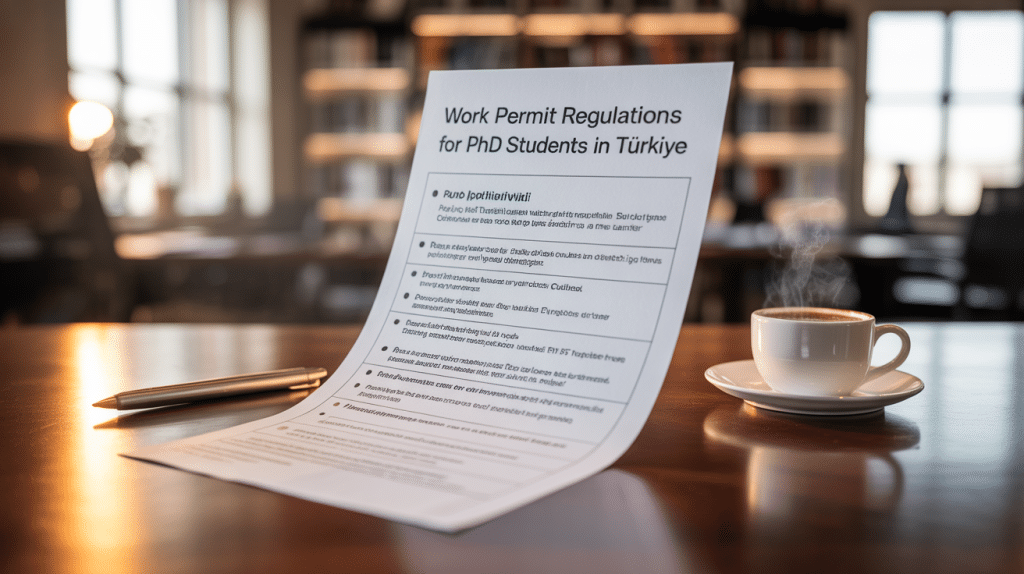Work Permit Regulations for PhD Students Who Teach or Have Assistantships in Türkiye
Eligibility Requirements
Before diving into the application process, it’s important for PhD students to understand the eligibility requirements for working as teaching or research assistants. Here are the main points to consider:
- Position Types: PhD students enrolled in accredited doctoral programs in Türkiye can work in specific positions, such as researchers or teaching assistants on university projects. Some private universities offer scholarships in exchange for assistantships.
- Work Permit Necessity: All international students must secure an official work permit to legally work in Türkiye. This is a non-negotiable requirement that cannot be overlooked.
- Application Oversight: Importantly, individuals cannot apply for work permits independently. Applications must be submitted through their universities to the Ministry of Labor, Family and Social Services.
Application Process for Work Permits
Navigating the application process for work permits can be complex but is essential for international PhD students. Below is a structured outline of steps involved:
- Initial Application: International PhD students must first apply for a work permit through a Turkish consulate or embassy in their home country.
- Visa and Residence Permit Updates: It may be necessary to update the study visa and residency permit according to the requirements for employment.
- Consult University Resources: To expedite the process and resolve any potential complications, students should seek assistance from their university’s international office before proceeding with the application.
Important Note: Many doctoral students working as university employees in Türkiye must comply with regulations concerning foreign workers.
Work Conditions and Limitations
Even after obtaining a work permit, PhD students need to adhere to certain work conditions. Here are the critical aspects:
- Part-time Requirement: Work must generally be part-time and fit within the student’s class schedule.
- Monthly Hour Limits: There are restrictions on the number of hours students can work each month, ensuring that employment does not interfere with academic performance.
- Language Proficiency: Non-Turkish speakers may find it challenging to secure jobs; hence, university-based positions are often the most viable option.
Research Permits for Conducting Studies
PhD students in Türkiye who engage in research as part of their doctoral programs or assistantships must obtain specific research permits. The requirements include:
- Annual Permissions: Foreign scholars must receive official permissions to conduct research at institutions in Türkiye each calendar year.
- Documentation for Long-Term Research: For research terms extending beyond three months, students need to provide additional documentation to acquire the appropriate permits.
- Residence Permit: Students must secure a residence permit from local authorities within 30 days of their arrival for long-term stays.
Financial Considerations
Working as a teaching or research assistant is not only beneficial for academic growth but also provides substantial financial support. The average monthly living cost for a PhD student in Türkiye is approximately €345, which typically includes:
- Accommodation: around €100
- Food: approximately €175
- Miscellaneous Costs: about €70
By understanding and adhering to work permit regulations, PhD students can effectively combine their academic pursuits with relevant teaching and research experience, allowing them to thrive during their time in Türkiye.
Top Universities Supporting PhD Students
If you’re considering applying for a PhD program in Türkiye, several universities offer strong support for international students through work opportunities. Among these are:
These institutions not only provide a robust academic environment but also numerous opportunities for teaching and research assistantships, ensuring PhD students can gain valuable experience while studying.
Take the Next Step with Study in Turkiye
Navigating the landscape of work permits in Türkiye can seem daunting, but with thorough preparation and understanding of the requirements, it can lead to rewarding opportunities for personal and professional growth. If you are an international recruiter, university admissions team, or HR professional, an effective approach to advising and assisting students regarding their moves to Türkiye is essential.

